高二英语上册Unit1教学设计4
高二英语上册Unit1教案
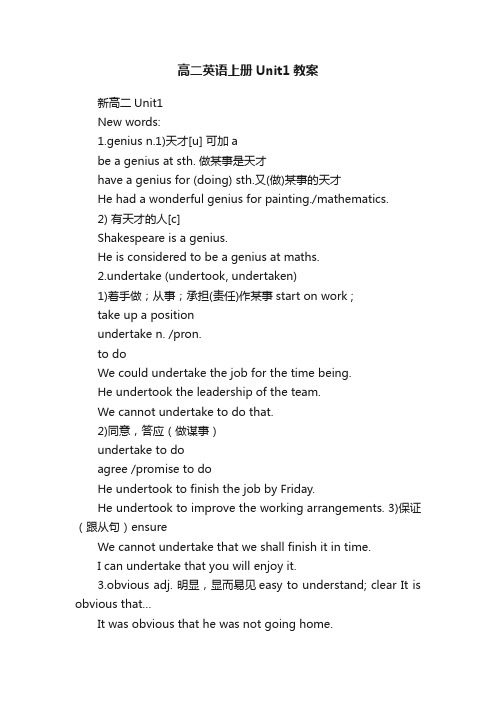
高二英语上册Unit1教案新高二Unit1New words:1.genius n.1)天才[u] 可加abe a genius at sth. 做某事是天才have a genius for (doing) sth.又(做)某事的天才He had a wonderful genius for painting./mathematics.2) 有天才的人[c]Shakespeare is a genius.He is considered to be a genius at maths.2.undertake (undertook, undertaken)1)着手做;从事;承担(责任)作某事start on work ;take up a positionundertake n. /pron.to doWe could undertake the job for the time being.He undertook the leadership of the team.We cannot undertake to do that.2)同意,答应(做谋事)undertake to doagree /promise to doHe undertook to finish the job by Friday.He undertook to improve the working arrangements. 3)保证(跟从句)ensureWe cannot undertake that we shall finish it in time.I can undertake that you will enjoy it.3.obvious adj. 明显,显而易见easy to understand; clear It is obvious that…It was obvious that he was not going home.It is obvious that he is lying.obviously adv. 显而易见地can be easily seen Obviously you didn’t read it.4.curious adj. 好奇的,好求知的,爱打听隐私的be curious aboutto doThe boy was curious about everything he saw.He was curious to know what was happening in the office.curiously adv.好奇地,说也奇怪Philip looked curiously at the people.Obviously enough he had never seen the little girl.5.debate n.辩论;争论[c]a long debatevi. 1) debate about sth.argue with sb.quarrelI debated (about) the question with Mary.考虑,讨论(如何好)debate whether to dowhetherI debate whether to accept the job.We were debating where we should go.I’m just debating whether to go or stay.2)argue sb. into (out of ) doing说服某人做(不做)某事He argued her into( out of ) going.6.promising adj. 有希望的,有前途的a promising leaderv.1)答应;许下诺言promise sb. sth 接双宾语to dothatHe promised his daughter a present for her birthday.Y ou must promised me to take a thorough rest.I had promised Mary to attend the show.Y ou must promise me that you won’t do that again.比较: He promised me to go.He permitted me to go.2)有希望…,可能会(有)It promises to be fine tomorrow.This promises to be an interesting evening.The clouds promise rain.The sky promised a storm.come truecontinue fineturn out to bestay/keep/remain7.research n. v.探索,调查,研究do research in/into 对进行研究make on 在…方面进行研究carry outhe has done a good deal of research on that subject.research into/onHe is researching into the reading problems of young school children .to research into (on ) the effects of cigarette smoking.8.disable vt.使丧失能力disabled adj. 有残疾的the disabled 有残疾的人disability n. 残废people with disabilityHe was disabled in the accident.An accident disabled him from playing football.The disabled are to receive more money.9.seek (sought, sought) vt.i.寻找,探求,追求(多用书面语)seek opportunities/employment/adviceseek to do设法,企图,试图I have never sought to hide my views.We sought to change his mind.search for/ look for/ hunt for10.observe v.1)注意到,观察observe n./ pron.sb./sth. doingsb. / sth. do/ to bethatThey are observing stars.They were observed entering the bank.They didn’t observe Peter come in and go upstairs.The only thing that I have observed to be without limit is the businessman’s desire for profits.We observed that it had turned cloudy.2)遵守The doctors observe this rule.3)庆祝,过(某种节日)=celebrateDo they observe/celebrate Christmas in that country?11.match v.1)和…较量,让…和…比赛He matched his brother against (with) the champion.2)相配=go withShe matched the carpet with some very nice curtains.These shoes do not match; one is large and the other is small.相等,发现,(找到)相等物链接:go with/suit/fit/agree with12.patient adj. 耐心的patiently adv. 耐心地patience n. 耐心,忍耐力[u]1) be patient with sb. 对某人耐心Y ou are very patient with me.Just be patient a while.2)The girl waited patiently for his decision.3) He had no patience with her.He showed the greatest patience.13.experiment n. v.1)试验,实验[c]carry out experiment in chemistryperformdo2)试验(总称)[u]尝试Some people learn by experiment and others by experience.Making a difference有所作为W ARMING UP1.Albert Einstein (1879-1955), was born in Ulm Germany, German-bornAmerican physicist and won the Nobel Prize. Best known for his theories of relativity. He is perhaps the most well-known scientist of the 20th century.2.Marie Curie (1867-1934), Polish scientist, was born in Warsaw. She gotmarried in 1895 with the French physicist, Pierre Curie. The Curies together with another scientist obtain the Nobel Prize for Physics in 1903.In 1911 she again got the Nobel Prize but for chemistry.3.Thomas Alva Edison (1847-1931)was born in Ohio, a great Americaninventor. When he was a child, he was always asking questions and tryingout new ideas. No matter how hard it was, he never gave up. He would keep trying out different ideas until he invented what he wanted. When he invented an electric light. He tried over two thousand materials before discovering one that would work. He had 1093 inventions.4.Alfred North Whitehead (怀特黑得1861-1947),British mathematician,logician and philosopher best known for his work in mathematical logic and the philosophy science and contributed to twentieth-century logic and metaphysics.5.Galileo Galilei (1564-1642) was born in Pisa, Italy, famous astronomerand physicist. He is the first person to use a telescope to study the skies.At that time it had been taken foe granted that the earth was the center of the universe. His discoveries made sure that the earth goes round the sun. Warming up1.Nothing in life is to be feared…a. be to do1)安排好的将来We are to hold sports meet next week.2)必须mustY ou are to / must be back at six.All these things are to be answered for.b. be about to do最近的将来,不同时间状语连用I’m about to leave.不说I’m about to leave in ten minutes.用于下列句型:be about to do…when…I was about to leave when the telephone rang.In such dry weather, the flowers will have to be watered if they ___. A.have survived A. are to survive C. would survive D. will survivec. be going tod. will1)客观事实Tomorrow will be Sunday.2)没有准备的将来---I forgot to post your letter.---I’ll post it myself.2. similar adj. like or alike, of the same kind类似,相似,差不多be similar to …同…差不多We have similar opinions; my opinions are similar to his.His views are similar to mine.alike adj. like one another m, the same(仅用作表语) adv.The two brother are very much alike.The two office buildings are alike in size and shape.She treats all her children alike.链接:be familiar to sb, / sth. 熟悉be the same as 同…一样be the same to sb.对…来讲一样It’s all the same to me. 对我来说无所谓,什么都可以.be different from与…不同,be different in 在…方面不同similarity n.1) [u]类似性,相似性How much similarity is there between the two brothers?There is not much similarity between two brothers.2)相似之处[c]There are other similarities.3.What’s the English word for this object?What’s the word for “travel” in French ? “travel”这个词法语怎么说?4.doubt1) v. be uncertain (about)怀疑,不相信(同)questionI don’t do ubt /question that he is telling the truth.I doubt /question whetherif it is true.thatI doubt that he will come.疑问,否定用that肯定用if/ whether / that2) n. There is no doubt that …There is some doubt whether…There is no doubt that he is guilty.There is some doubt whether he is guilty.3)There is no doubt about/of4)without doubt毫无疑问in doubt不一定,不能肯定The whole matter is still in doubt.throw/cast doubt on使人对。
新教材高二英语人教版(2021)选择性必修第一册 Unit 1-5 教案
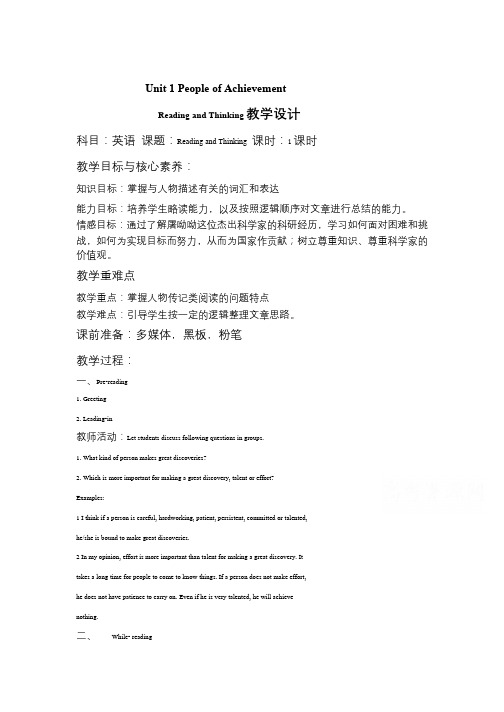
Unit 1 People of AchievementReading and Thinking 教学设计科目:英语课题:Reading and Thinking 课时:1 课时教学目标与核心素养:知识目标:掌握与人物描述有关的词汇和表达能力目标:培养学生略读能力,以及按照逻辑顺序对文章进行总结的能力。
情感目标:通过了解屠呦呦这位杰出科学家的科研经历,学习如何面对困难和挑战,如何为实现目标而努力,从而为国家作贡献;树立尊重知识、尊重科学家的价值观。
教学重难点教学重点:掌握人物传记类阅读的问题特点教学难点:引导学生按一定的逻辑整理文章思路。
课前准备:多媒体,黑板,粉笔教学过程:一、Pre-reading1. Greeting2. Leading-in教师活动:Let students discuss following questions in groups.1. What kind of person makes great discoveries?2. Which is more important for making a great discovery, talent or effort?Examples:1 I think if a person is careful, hardworking, patient, persistent, committed or talented,he/she is bound to make great discoveries.2 In my opinion, effort is more important than talent for making a great discovery. Ittakes a long time for people to come to know things. If a person does not make effort,he does not have patience to carry on. Even if he is very talented, he will achievenothing.二、While- reading1. 教师活动:Explain the new words in the text, then let students scan the text andfind descriptive words about Tu Youyou.2. 学生活动:略读文本,完成以下问题,师生核对答案。
高二英语上册Units1-8同步优质教案
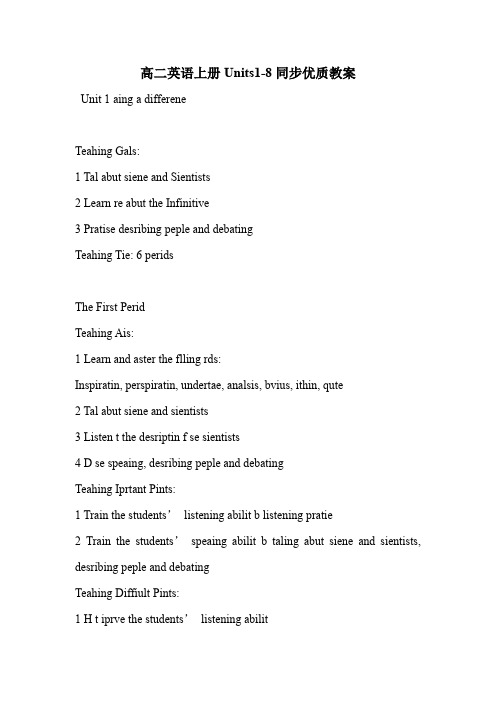
高二英语上册Units1-8同步优质教案Unit 1 aing a differeneTeahing Gals:1 Tal abut siene and Sientists2 Learn re abut the Infinitive3 Pratise desribing peple and debatingTeahing Tie: 6 peridsThe First PeridTeahing Ais:1 Learn and aster the flling rds:Inspiratin, perspiratin, undertae, analsis, bvius, ithin, qute2 Tal abut siene and sientists3 Listen t the desriptin f se sientists4 D se speaing, desribing peple and debatingTeahing Iprtant Pints:1 Train the students’listening abilit b listening pratie2 Train the students’speaing abilit b taling abut siene and sientists, desribing peple and debatingTeahing Diffiult Pints:1 H t iprve the students’listening abilit2 H t help students finish the tas f speaingTeahing ethds:1 aring up t aruse the students’interest in siene2 Listening-and-ansering ativit t help the students g thrugh the listening aterial3 Individual, pair r grup r t ae ever student r in lassTeahing Aids: 1 a ultiedia 2a tape rerder 3the blabardTeahing Predures:Step I aring up1T: There are an utstanding sientists in the rld, h ade great ntributins t siet and siene N l at the pitures n page 1, tell e hat are these sientists faus fr? (Bb) Sientists ntributinsaria urie Radiu /PlniuAlbert Einstein The Ther f Relativit…2T: ell dne I thin u are all interested in siene and sientists hat d u thin aes a suessful sientist? Have a disussin in pairs r grups f fur Then reprt the results f ur disussin(It is the a he uses his tls that aes a suessful sientistA suessful sientist ust have uh iaginatin and intelligene and he ust be reative and hard-ringA suessful sientist ust be nfident, urius and areful But hat I lie t n is hat ade hi/her interested in siene…)T: N l at the qutes n page 1d u n hat the ean? And d u agree?天才就是百分之九十九的汗水加上百分之一的灵感。
高中高二英语上册第一单元说课案

高中高二英语上册第一单元说课案上课内容:高中高二英语上册第一单元教学目标:1. 通过讲解和练习,使学生了解有关人称代词和物主代词的使用。
2. 通过课堂活动和练习,让学生能够熟练运用人称代词和物主代词描述人和事物。
3. 通过听说读写综合训练,提升学生的语言表达能力和沟通能力。
教学重难点:1. 人称代词和物主代词的用法和区别。
2. 能够准确用人称代词和物主代词描述人和物。
教学准备:1. 教材:高中高二英语上册第一单元教材。
2. 多媒体设备:用于展示教材中的图片和视频。
3. 课堂练习和测验。
教学步骤:第一步:导入(5分钟)通过展示一些图片,引导学生回忆人和物的名称,并提问:- What's this?(指向图片上的一个人或物)- What's his/her name?- Is it a boy/girl/man/woman?第二步:讲解与练习(15分钟)通过多媒体展示教材中的相关图片和例句,讲解人称代词和物主代词的用法和区别。
重点讲解以下内容:- 人称代词的用法和主要形式:I, you, he, she, it, we, they。
- 物主代词的用法和主要形式:my, your, his, her, its, our, their。
- 人称代词和物主代词的区别:人称代词用来代替人或事物的名称,物主代词用来表示所属关系。
在讲解的过程中,结合课堂练习进行巩固和反馈,让学生积极参与。
第三步:交际活动(10分钟)通过角色扮演、对话练习等活动,让学生能够运用所学的人称代词和物主代词进行真实场景的交际练习。
例如:- 学生之间进行问候和自我介绍。
- 学生之间用人称代词和物主代词描述自己和对方的相貌、性格特点、爱好等。
第四步:拓展与应用(15分钟)通过展示一些图片或视频,让学生描述其中的人或物,并用人称代词和物主代词进行句子的造句练习。
例如:- 展示一张家庭照片,让学生用人称代词和物主代词描述照片中的每个人。
新人教版高二英语教案Unit 1 Period 4 Listening
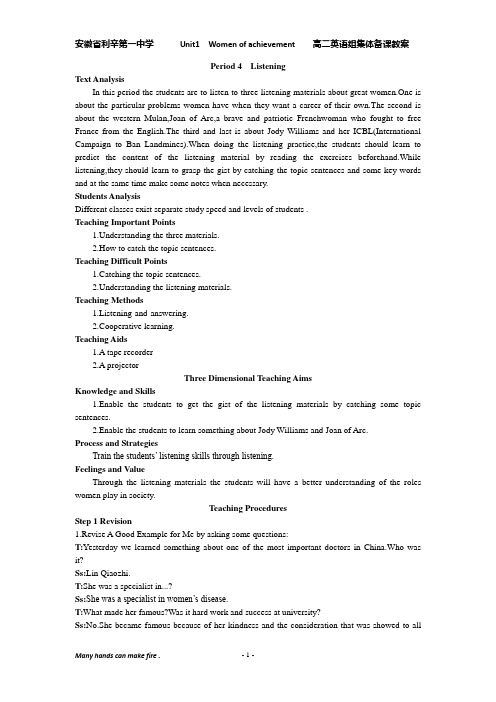
安徽省利辛第一中学 案Unit1 Women of achievement高二英语组集体备课教Period 4 Listening Text Analysis In this period the students are to listen to three listening materials about great women.One is about the particular problems women have when they want a career of their own.The second is about the western Mulan,Joan of Arc,a brave and patriotic Frenchwoman who fought to free France from the English.The third and last is about Jody Williams and her ICBL(International Campaign to Ban Landmines).When doing the listening practice,the students should learn to predict the content of the listening material by reading the exercises beforehand.While listening,they should learn to grasp the gist by catching the topic sentences and some key words and at the same time make some notes when necessary. Students Analysis Different classes exist separate study speed and levels of students . Teaching Important Points 1.Understanding the three materials. 2.How to catch the topic sentences. Teaching Difficult Points 1.Catching the topic sentences. 2.Understanding the listening materials. Teaching Methods 1.Listening-and-answering. 2.Cooperative learning. Teaching Aids 1.A tape recorder 2.A projector Three Dimensional Teaching Aims Knowledge and Skills 1.Enable the students to get the gist of the listening materials by catching some topic sentences. 2.Enable the students to learn something about Jody Williams and Joan of Arc. Process and Strategies Train the students’ listening skills through listening. Feelings and Value Through the listening materials the students will have a better understanding of the roles women play in society. Teaching Procedures Step 1 Revision 1.Revise A Good Example for Me by asking some questions: T:Yesterday we learned something about one of the most important doctors in China.Who was it? Ss:Lin Qiaozhi. T:She was a specialist in...? Ss:She was a specialist in women’s disease. T:What made her famous?Was it hard work and success at university? Ss:No.She became famous because of her kindness and the consideration that was showed to allMany hands can make fire . -1-安徽省利辛第一中学 案Unit1 Women of achievement高二英语组集体备课教her patients. T:Good. 2.Check workbook exercise 1 on Page 45. T:I remembered asking you to read a passage about another great woman.Have you done that? Ss:Sure. T:Which great woman is talked about? Ss:Elizabeth Fry. T:What did she do? Ss:She devoted all her efforts to improve the prison conditions. T:Good.Now let’s check the answers to exercise one. Get the students to check the answer. Suggested answers: Notes on English prisons in the 19th century The women were treated like animals. They had no beds,clean clothes,food or heating. The children born in prison had to stay there and had no chance of an education. Elizabeth Fry’s suggestions She taught the women to sew,knit and make goods to sell. She provided food,clean clothes and straw for beds. She began a prison school for the children.Step 2 Listening on Page 7 The teacher should ask the students to glance the whole exercises before listening,so that they can realize what the main task is in listening. 1.Brainstorming T:These days we have been talking about important and great women and their achievements.We know women are able to make the same achievements as men.But was it easy for them to make the achievements? Ss:Of course not. T:You are right.They have to overcome a lot of difficulties in achieving their goals.Even now if women try to get the same as men they will come across quite a lot of problems that men will not have.Today we’ll listen to the problems that exist. 2.Listening for the first time T:When we listen to a certain material for the first time,we should not try to catch every single word,and that is impossible.We should try to catch the general idea.To catch the gist,catching the topic sentences is of great importance.The structure of this material is very clear.It is organized by the three paragraphs.So when you listen for the first time,try to get the topic sentence of each paragraph.Now let’s listen for the first time. Play the tape for students to get the topic sentences of the paragraphs and finish the exercises. Make a pause when necessary. Then ask students to discuss with their partners and try to retell what they have heard.It doesn’t matter whether they get words or sentences because the purpose of doing this is to let students know how to get the main idea from the topic sentence. Collect what they have heard and writes down them on the blackboard. Check the answers to Exercise 2 with the whole class.Many hands can make fire . -2-安徽省利辛第一中学 案Unit1 Women of achievement高二英语组集体备课教Suggested answers: The three problems that women have and that do not apply to men are: 1)They have more difficulty getting an education. 2)They have more difficulty getting to the top of their chosen career. 3)They have to give up their careers for the childcare and running the home. 3.Listening for the second time The purpose in this task is to let the students get some useful information to finish Exercises 1 and 3.Before playing the tape for the second time,asks the students to read through the two exercises and try to predict the answers. Then the teacher plays the tape again. 4.Listening for the third time This is a good chance for the students to check their answers.After listening twice,most students can have a good understanding about the material,and can write down most of the answers.So this time is for them to check and add their answers. Then the teacher has the students check the answers in groups. At last the teacher checks the answers with the whole class. Suggested answers to Exercise 1. 1)Girls often leave school earlier for family reasons.(T) 2)When there is little money,the school often prevents girls from training.(F) When there is little money, the family often gives the chance to the boys instead of the girls to go to school. 3)Girls don’t have a chance to run a company.(F) Women have a chance,but they need to prove they can run business successful before they get the chance. 4)When women have children,they have to stop work.(T) 5)Men have more chances to get to the top of their career than women.(T) 6)Men can do whatever they like.(F) This is too absolute.Men only don’t have to overcome so the problems as women do. Suggested answers to Exercise 3. 1)prevents,career 2)childcare,concern,pressure 3)difficulties Step 3 Listening on Page 44 1.Predicting the content T:Although women have to meet a lot of difficulties some of them still stick to their ideals and finally succeed in achieving their aims.Today we are going to hear something about another important woman.Please turn to Page 44.Look at the picture.Who is it? Ss:Jody Williams. T:Right.She is the head of ICBL(Internal Campaign to Ban Landmines) What is a landmine? Ss:We have no idea. T:A landmine is an explosive object hidden in or on the ground,which blows when a person or vehicle passes over it.Can you guess its meaning? Ss:Is it 地雷? T:Good.Next we are going to listen to a short dialogue between Jody Williams and aMany hands can make fire . -3-安徽省利辛第一中学 案Unit1 Women of achievement高二英语组集体备课教journalist.Now please read the two exercises on Page 44 to guess the content of the listening material.What might they talk about? Ss:From Exercise 2,we guess they might talk about Jody Williams and ICBL. 2.Listen for the first time to catch the main idea. T:OK.Let’s see.Listen for the first time to get the main idea and finish Exercise 1. After the first listening,get the students to say something about what they have heard and write down the key words on the blackboard.Get them to combine all the answers to make a ideal answer. Suggested answer: Jody Williams is explaining about her work for the International Campain to Ban Landmines. 3.Listen for the second time. Get the students to listen again and try to finish Exercise 2.This material is relatively easy.So pause when necessary,enabling them to catch the answers.Then check the answers. Suggested answers: Research notes on ICBL 1 Its leader 2 Its aims Jody Williams to stop the making and use of landmines everywhere in the world ICBL members in different countries spread useful information on moving the landmines to help each other. working with governments all over the world to organize the groups good 1997:181 countries agreed to ban the making and use of landmines the Nobel Peace Prize in 1997 was given to her and ICBL3 Its method of working 4 Its area of working 5 Jody Williams’ role 6 Her relationship with governments 7 The Oslo Agreement 8 The new honour4.Listen for the third time Get the students to listen to the material again and check the answers. Step 4 Listening on Page 41 (For some students it is difficult to finish the listening material as well as the previous two ones in one class.So this one can be left as homework.) This listening material is about Joan of Arc,a patriotic woman who fought to free France from the English.Get the students to predict the content of the material and then listen to it for three times.For the first time,they don’t have to write anything.Instead they should listen to understand the whole material and get the general idea.As for the second time,they should be able to get all the answers to the questions.And the last time,check the answers. Suggested answers: 1.Because at that time women were not allowed to be soldiers. 2.The church thought Joan had not behaved as a woman should. 3.They did not have leaders to inspire them or who had good ideas for winning battles. 4.Because she had many good ideas for attacking the enemy.She had shown them thus they couldMany hands can make fire .-4-安徽省利辛第一中学 案Unit1 Women of achievement高二英语组集体备课教win if they fought well and had a good plan for the battle.Even after she died,her spirit inspired the French army who ended the English rule in France at last. 5.The church made her a saint. Step 5 Summary and Homework In this class we again learn something about some important and great women.From their deeds we come to the saying that women are half of the sky.For girls we should believe that although we may face some difficulties,we are able to try our best to realize our dreams.And for boys we should not look down upon girls.Boys and girls or men and women should work together to make us a more beautiful world. OK,homework for today is to listen to the listening materials again after class.Find the reason why you made mistakes. The self-reflection and feed-back after classMany hands can make fire .-5-安徽省利辛第一中学 案Unit1 Women of achievement高二英语组集体备课教Many hands can make fire .-6-。
高二英语上学期Unit 1说课教案
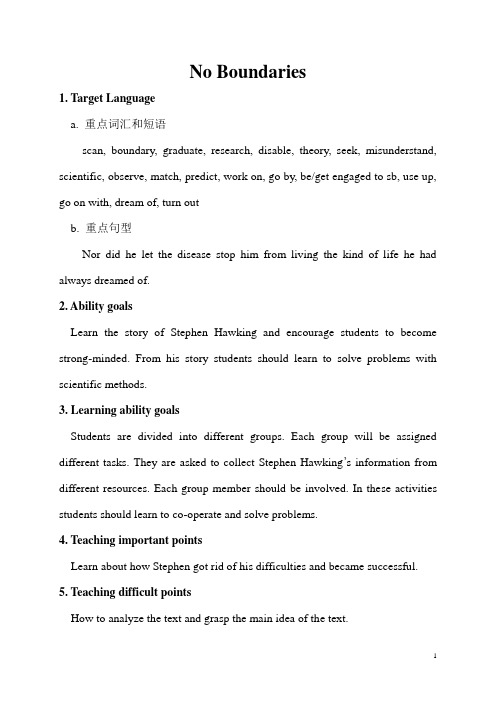
No Boundaries1. T arget Languagea. 重点词汇和短语scan, boundary, graduate, research, disable, theory, seek, misunderstand, scientific, observe, match, predict, work on, go by, be/get engaged to sb, use up, go on with, dream of, turn outb. 重点句型Nor did he let the disease stop him from living the kind of life he had always dreamed of.2. Ability goalsLearn the story of Stephen Hawking and encourage students to become strong-minded. From his story students should learn to solve problems with scientific methods.3. Learning ability goalsStudents are divided into different groups. Each group will be assigned different tasks. They are asked to collect Stephen Hawking’s information from different resources. Each group member should be involved. In these activities students should learn to co-operate and solve problems.4. T eaching important pointsLearn about how Stephen got rid of his difficulties and became successful. 5. T eaching difficult pointsHow to analyze the text and grasp the main idea of the text.6. T eaching methodsListening, reading, discussing7. T eaching aidsA tape recorder, a projector and a computer8. T eaching proceduresStep I RevisionCheck the homework. Give the answers to the listening part on Page 81. Ask students to say something about Stephen Hawking.Step II Leading inIn this class we are going to learn something about a great scientist. The title is “No Boundaries”. How do you understand the title?OK. Have you heard of Hawking’s famous no boundary proposal? He explains his proposal like this: … that both time and space are finite in extent, but they don’t have any boundary or edge. … There would be no singularities, and the laws of science would hold everywhere, including at the beginning of the universe. So when reading the title, people will think of Stephen Hawking. I’m glad you have learned something about Stephen Hawking. The text will tell us more about him.Step III ReadingAsk the students to scan the text and find the information about his misfortune, his attitude towards difficulty, results from his disease and his achievements. Then fill the information in the form.Show the form on the PowerPoint.T: From this form we can have a clear image of Stephen Hawking. Please discuss with your group members: What should we learn from Stephen Hawking?Students are given several minutes to discuss. Several minutes later, spokesmen or spokeswomen from different groups will stand up and speak out their opinions.Ask students to skim the text and then finish the first question of the Post-reading part.Careful readingRead the text carefully and find the answers to the following questions. Show the questions on the PowerPoints.1.According to Professor Hawking, how do people misunderstandscience?2.What are the basic steps of the scientific method?3.What is it that Hawking doesn’t like about his speech computer? Four minutes later, check the answers with the whole class.Sum up the main idea of each part.Ask the students to read through the text and grasp the main idea of the text. Part1 (Paragraph1~3)This part tells us about Stephen Hawking’s positive attitude towards life in the face of great difficulties. It is his positive attitude that helps him succeed.Part2 (Paragraph4~5)His achievements and his best seller A Brief History of Time.Part3 (Paragraph6)The basic steps of the scientific method.Part4 (Paragraph7)Science (The speech computer) enables Stephen Hawking to give lectures allaround the world.Step IV ExplanationDuring this procedure Teacher will play the tape for students. Students will underline the difficult sentences. After listening to the tape, Teacher will explain the text and deal with language problems.There did not seem much point in working on my PhD-I did not expect to survive that long?“point” here means reason, valueThere is no point in arguing further.Nor did he let the disease stop him from living the kind of life he had always dreamt of.Little did I dream of succeeding so well.seek (for, after)We sought an answer to the question, but couldn’t find one.They are seeking for solutions to the current problems.matchbe matched inThey are equally matched in their knowledge of Chinese.match … with/against …I’m ready to match my strength with/against yours.predictShe predicted that he would marry a doctor.Step V Post-readingStudents are given several minutes to go over the text to make sure they fully understand the text. Then come to the third group questions of Post-reading. These are open ending questions. Students are encouraged to give various solutions.Step VI HomeworkSurf on the Internet and find more about Stephen Hawking and his contributions to the world.。
高二英语教案:高二英语上册Unit 1课时教案4
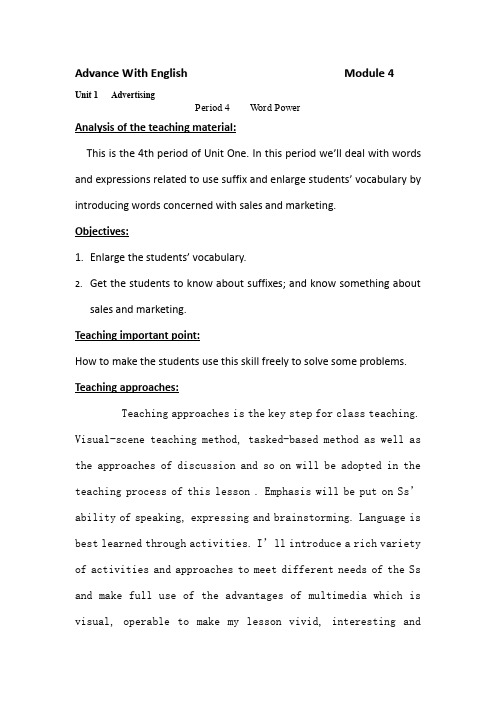
A d v a n c e W i t h E n g l i s h M o d u l e4Unit 1 AdvertisingPeriod 4 Word PowerAnalysis of the teaching material:This is the 4th period of Unit One. In this period we’ll deal with words and expressions related to use suffix and enlarge students’ vocabulary by introducing words concerned with sales and marketing.Objectives:1.Enlarge the students’ vocabulary.2.Get the students to know about suffixes; and know something aboutsales and marketing.Teaching important point:How to make the students use this skill freely to solve some problems. Teaching approaches:Teaching approaches is the key step for class teaching. Visual-scene teaching method, tasked-based method as well as the approaches of discussion and so on will be adopted in the te aching process of this lesson . Emphasis will be put on Ss’ ability of speaking, expressing and brainstorming. Language is best learned through activities. I’ll introduce a rich variety of activities and approaches to meet different needs of the Ss and make full use of the advantages of multimedia which is visual, operable to make my lesson vivid, interesting andeffective.Interaction Patterns: Teachers -class, individuals, pairsSs’ ability to work both independently and together is very important to their success in the future. It is therefore important for Ss to have opportunities to develop their English skills and knowledge independently, in pairs, in groups and as a class.Teaching Aids: multimedia and a blackboardProcedures for teaching:Step 1 Revision and Lead-in1.Ask Ss to finish the blank-filling.2.Ask them the question--- How are these new words formed?Step 2 Using Suffix1.Give more examples and make a competition in the class.2.Ask Ss---how to form adjectives from nouns and verbs.3.Have Ss do the exercise---best clothing shop.4.More information about suffix.5.Make Ss do the puzzle.Step 31.Active show to lead in the topic.eful expressions:ProductMarket researchSales and marketingSales/marketing departmentConsumersMarket shareSales targetMarket leaderHigh qualitySales figures3.Have Ss do Practice B.4.More exercise for consolidation.Step 41 Finish the Ex on Page 91.2 Make good preparation for Grammar and Usage.(撰写人:南京五中黄祖明方玉勇)。
最新高中高二英语上册第一单元说课案.doc
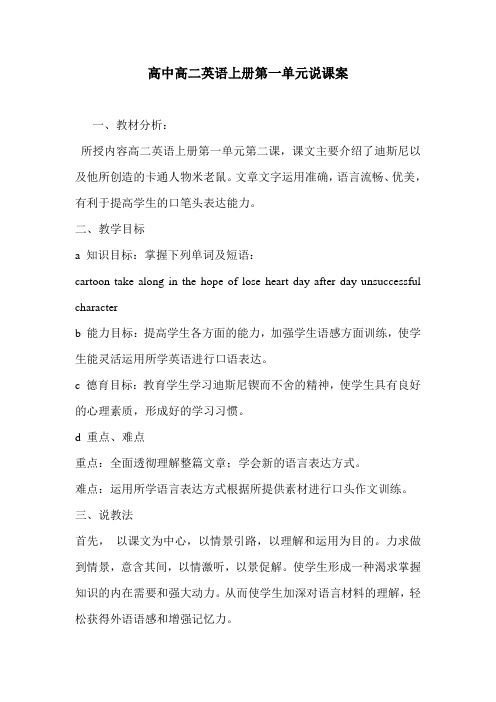
高中高二英语上册第一单元说课案一、教材分析:所授内容高二英语上册第一单元第二课,课文主要介绍了迪斯尼以及他所创造的卡通人物米老鼠。
文章文字运用准确,语言流畅、优美,有利于提高学生的口笔头表达能力。
二、教学目标a 知识目标:掌握下列单词及短语:cartoon take along in the hope of lose heart day after day unsuccessful characterb 能力目标:提高学生各方面的能力,加强学生语感方面训练,使学生能灵活运用所学英语进行口语表达。
c 德育目标:教育学生学习迪斯尼锲而不舍的精神,使学生具有良好的心理素质,形成好的学习习惯。
d 重点、难点重点:全面透彻理解整篇文章;学会新的语言表达方式。
难点:运用所学语言表达方式根据所提供素材进行口头作文训练。
三、说教法首先,以课文为中心,以情景引路,以理解和运用为目的。
力求做到情景,意含其间,以情激听,以景促解。
使学生形成一种渴求掌握知识的内在需要和强大动力。
从而使学生加深对语言材料的理解,轻松获得外语语感和增强记忆力。
其次,采取导学法、点拨法,始终实行启发诱导。
采取教师为主导,学生为主体,训练为主线的基本方法。
旨在充分调动学生的主动性和创造性,培养自学能力。
四、说学法爱因斯坦说过,兴趣是的老师。
在利用现代化的教学手段,创造出令学生感兴趣的情景后,抓住学生求新、好奇的心理特点,教师适当引导,使学生积极主动的去学习新知识,限度的调动学生参与到整个教学活动中。
从而提高学生分析问题、解决问题、语言运用诸方面能力的发展。
其次,学习知识的途径是由自己去发现。
老师的责任是指导学生如何去发现。
教是为了不教,激发学生乐学和会学,提高创新能力。
五、教学程序1、用动画片头导入。
目的是运用小电影式的开场,激发学生浓厚的兴趣,为学习课文做准备。
2、背景介绍。
画面出现三张迪斯尼青年、中年和老年的照片配英语旁白。
引导学生猜出照片上的人物迪斯尼,然后让学生谈谈他们所了解的迪斯尼。
高二英语上学期unit1整单元的教案.doc
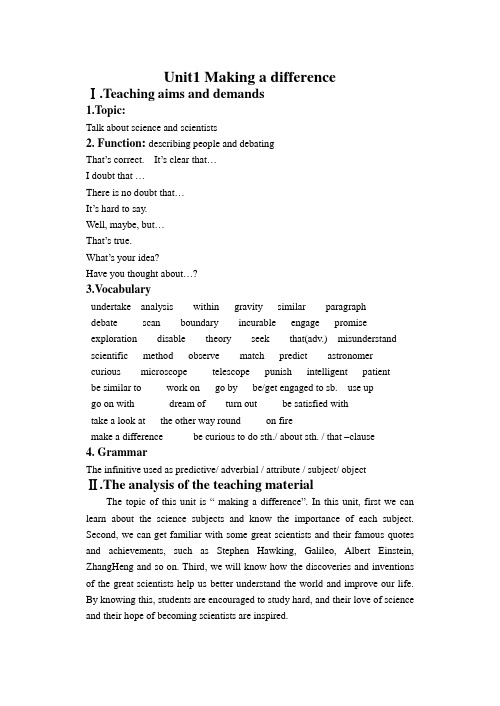
Unit1 Making a differenceⅠ.Teaching aims and demands1.Topic:Talk about science and scientists2. Function: describing people and debatingThat’s correct. It’s clear that…I doubt that …There is no doubt that…It’s hard to say.Well, maybe, but…That’s true.What’s your idea?Have you thought about…?3.Vocabularyundertake analysis within gravity similar paragraphdebate scan boundary incurable engage promise exploration disable theory seek that(adv.) misunderstand scientific method observe match predict astronomercurious microscope telescope punish intelligent patientbe similar to work on go by be/get engaged to sb. use upgo on with dream of turn out be satisfied withtake a look at the other way round on firemake a difference be curious to do sth./ about sth. / that –clause4. GrammarThe infinitive used as predictive/ adverbial / attribute / subject/ objectⅡ.The analysis of the teaching materialThe topic of this unit is “making a difference”. In this unit, first we can learn about the science subjects and know the importance of each subject. Second, we can get familiar with some great scientists and their famous quotes and achievements, such as Stephen Hawking, Galileo, Albert Einstein, ZhangHeng and so on. Third, we will know how the discoveries and inventions of the great scientists help us better understand the world and improve our life. By knowing this, students are encouraged to study hard, and their love of science and their hope of becoming scientists are inspired.1.Warming up: It offers us five pictures of foreign great scientists with their famous quotes. By learning their quotes and talking about their achievements, students can know about the key to success and make their minds to be successful.2. Listening:It contains 4 great minds including the students. In fact, it provides three passages and the students are asked to have a guess who they are, which is so interesting that it may further arouse the student s’ enthusiasm in science.3. Speaking: The students are asked to have a debate about which branch of science is the most important and useful to society. By doing so, students can practice debating skills and use some useful expressions freely. At the same time, they will find that knowledge plays an important part in our daily life.4.Pre-reading The three questions in pre-reading pave the way for reading.5.Reading: The text describes Hawking’s disease, dream, achievements and opinions on science and scientific research.6. Post-reading: The exercises help the students further understand thisgreat scientist.7. Language study It contains word study and grammar. Students will havea better knowledge of the uses of the infinitive in this part.8.Integrating skills It includes reading and writing. In the reading passage, students can learn about characteristics of five scientists and their scientific spirit. In the writing part, students are asked to write a paragraph to describe a favourite scientist.9. Tips Unit One also gives students some advice on how to use the scientific method to learn English.10. checkpointIt sums up the uses of the infinitive.Ⅲ.Teaching arrangementsPeriod 1&2: Warming up, listening and speakingPeriod 3&4: readingPeriod 5: Language studyPeriod 6: Integrating skills and writingNotes:1. Amending In warming up, it’s too abstract for the students to talk about the quotes, so we deal with it as a unit task to the students at the very beginning-―make up a column about scientists and their quotes.2. Replacement In speaking, the text gives the students the debate: Which branch of science is more important and useful to our society?It’s too difficult and abstract for the students to carry it out. The reasons are as follows:1) Their vocabulary is not large enough.2) It’s too difficult to divide each branch of science in our daily life.In fact, each branch can’t be divided from the others. Only by combining them together, can we make our world more beautiful.So we change the topic, and ask the students to talk about what has happened in our daily life. That is , should a nuclear power station be built in Sanmen? This topic can give the students lots of space to talk about.3. Adding This unit doesn’t give a good sample for the students to write about a scientist. So it is also very difficult for the students to do the writing well. Because of this, we add a research task to the students after finishing the reading material No Boundaries. (What is science and what is the spirit of a scientist? Do research on your favorite scientist and try to find out what makes him /her successful. The students are asked to finish the task by surfing the Internet.) With the help of the first unit task--- to make up a column about scientists and their quotes, it’s possible for the students to write a good article about a favorite scientist.Ⅳ.Teaching proceduresPeriod 1&2: Warming up, listening & speakingGoals:1.To encourage the students talk about the science and scientists2.To develop the students’ ability of listening for information3.To enable the students to have a better understanding of the importance of science.Teaching proceduresStep1. Warming upTask 1. Class workT: Nice to see you again. I miss you very much. And I’m glad to meet some new students here! Nice to meet you!T: What makes you get together here/ get apart with your former classmates ? Some of us learn arts/ science while others learn science / arts.Task2 Class workTask3. Pair workWhy do you learn arts/ science?I ’m good / poor at …I prefer … to …I ’m into …Because I like/ dislike...I want to beMy parents want me to …My dream is …Task4. Individual workWhat is your dream? What will you do to make your dream come true? Step2. ListeningPre-listeningHaving heard your dreams, I am glad to know all of you have great mind. I ’m sure one day you ’ll become great minds (great men /women).Before we realize our dreams, we should learn about some great minds first so that we can follow them, do you think so?Task1. Class workTask2. Individual workEnjoy the video, listen carefully and find out who are mentioned in the video. (Copernicus, Galileo, Kepler and Newton.)Task3 Pair workEnjoy once more. What are they famous for?Task4 Individual workListen to the three passages , finish the exercises and talk about the scientists. Enjoy a video and do the listening comprehension on the screen.Step3. SpeakingThanks to the discovery of Madam Curie---- Uranium ( show the slide) and the equation of Einstein ( slide ), nuclear power station can be built nowadays. It is reported a nuclear power station is being built in Sanmen. Someone says it is a good thing, while others don’t think so. (Show slides to help the students learn more about the disadvantages and advantages of it.)Task1 Group workDebating (Should a nuclear power station be built in Sanmen?)The following useful expression may give the students help.That’s correct. It’s clear that…I doubt that …That’s true. It’s hard to say. Well, maybe, but …There is no doubt that…What’s your idea? Have you thought about …? Step4. Homework1. Finish off the WB listening.2. Make up a column about scientists and their quotesPeriod 3 & 4 : Pre-reading , reading & post-readingGoals:1. To get to know something about the famous scientist Stephen Hawking.2. To learn the spirit of Hawking3. To develop some basic skills of readingTeaching ProceduresStep1. Pre-readingTask1: Class workDuring the last period, we talked about a lot of scientists and their great achievements.Can you use one adjective to describe science?Do you know any disabled scientist?Today we are going to talk about a disabled scientist.Task2. Class workEnjoy the video and guess who he is.Does he move his lips while speaking?Task3. Individual workListen and answer:1). How does he make a speech without moving his lips?(through a speech computer)2) What is it that Hawking doesn’t like about his speech computer? (It gives him an American accent.)Step2. ReadingT: Do you want to know more about Hawking? S: Yes.T: What do you want to know about him? S: his family, his achievements … T: Turn to P3Task1: Group workTask2: Individual work1) How would ordinary people feel when they were told that they had an incurable disease?2) What did Stephen Hawking do when he was told that he had an incurable disease?3) What is Hawking ’s dream?4) Read Para3 and Para4. Fill in the blanks.5. What are the steps of the scientific method?6. How do people misunderstand science?7. What is Hawking’s opinion about science?Task3. Group workNow we know that in Hawking’s opinion even the best theory can turn out to be wrong.1. Suppose Hawking’s theory of Black Holes was found wrong by himself, would he admit it ? Have a discussion and give your reasons.2. Show the students the fact with the slide.Task4.Class workHow do you understand the title “No boundaries”?Suggested answers:Unanswered questions have no boundaries.sciencein thinking.imagination.There are no boundariesbetween truth and falsehood (谬误)the healthy and the disabled.Step4.Homework:Group work research workWhat is science and what is the spirit of a scientist? Do research on your favorite scientist and try to find out what makes him /her successful.Use a library or the Internet to finish the research work./quotes/abhotswh.html/a/20040513/000320.htm/20020926/3069093.shtml/sevenlit/bacon//txt/sc/un/ot/9909unot01-01.htm/Literature/Biographies/Science/Copernicus.htm/Literature/Biographies/Science/Scients.htmPeriod 5 Word Study &GrammarGoals:1. To get the students to reflect on the useful words and phrases in this unit2. To enable the students to have a better knowledge of the uses of the InfinitiveTeaching Procedures:Step 1. Individual work1.Ask the students to tell the spirits of disabled people and what they can learn from them.2.Finish the exercises in the SB Page 5Suggested answers:1.(A)这对夫妇花光了所有的钱去找他们六个月前失踪的五岁儿子.2.(C)大家很容易看出她不高兴.3.(B)牛顿自言自语: “为什么苹果会落到地上,而不会飘向空中?”。
高二上(unit 1-10)教案集(人教版高二英语上册教案教学设计)
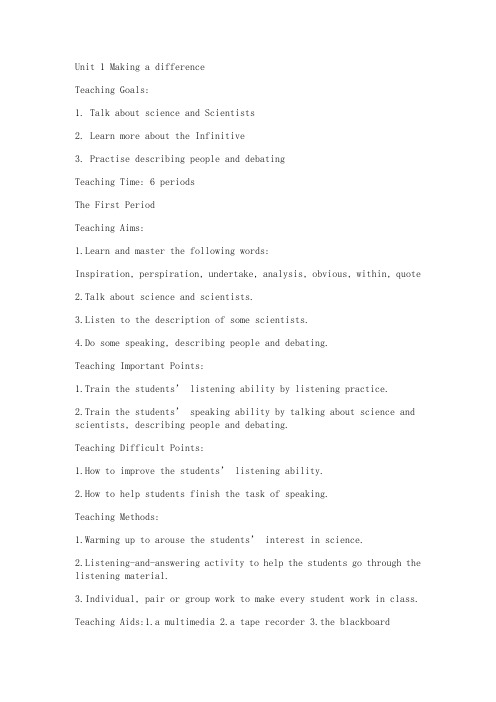
Unit 1 Making a differenceTeaching Goals:1. Talk about science and Scientists2. Learn more about the Infinitive3. Practise describing people and debatingTeaching Time: 6 periodsThe First PeriodTeaching Aims:1.Learn and master the following words:Inspiration, perspiration, undertake, analysis, obvious, within, quote2.Talk about science and scientists.3.Listen to the description of some scientists.4.Do some speaking, describing people and debating.Teaching Important Points:1.Train the students’ listening ability by listening practice.2.Train the students’ speaking ability by talking about science and scientists, describing people and debating.Teaching Difficult Points:1.How to improve the students’ listening ability.2.How to help students finish the task of speaking.Teaching Methods:1.Warming up to arouse the students’ interest in science.2.Listening-and-answering activity to help the students go through the listening material.3.Individual, pair or group work to make every student work in class.Teaching Aids:1.a multimedia 2.a tape recorder 3.the blackboardTeaching Procedures:Step I Warming up1.T: There are many outstanding scientists in the world, who made great contributions to society and science. Now look at the pictures on page 1, tell me what are these scientists famous for?(Bb) Scientists ContributionsMaria Curie Radium /PoloniumAlbert Einstein The Theory of Relativity…2.T: Well done. I think you are all interested in science and scientists. What do you think makes a successful scientist? Have a discussion in pairs or groups of four. Then report the results of your discussion.(It is the way he uses his tools that makes a successful scientist.A successful scientist must have much imagination and intelligence and he must be creative and hard-working.Asuccessful scientist must be confident, curious and careful. But what I like to know is what made him/her interested in science…)T: Now look at the quotes on page 1.do you know what they mean? And do you agree?天才就是百分之九十九的汗水加上百分之一的灵感。
高二英语上册unit1说课教案新部编本
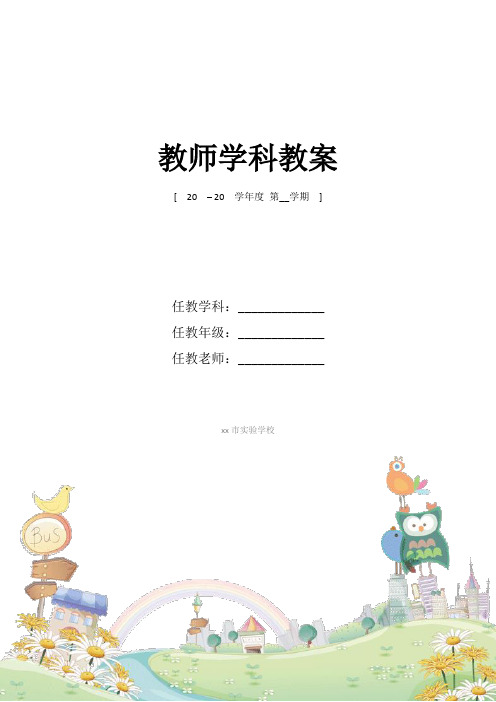
教师学科教案[ 20 – 20 学年度第__学期]任教学科:_____________任教年级:_____________任教老师:_____________xx市实验学校Unit1 Making a difference1.热衷于be on fire for2.与…相似,近似be similar to3.有…共同点have …in common4.因…而闻名be famous for5.从事于…work on6.与…订婚be engaged to7.事实上in fact8.继续干go on with/go on doing/ go on to do9.梦想,梦到dream of10做讲座give lectures11.在二十世纪七十年代早期in the early 1970’s /1970s12.问题的答案answers to questions13.另一方面on the other hand14.结果是,证明是,原来是turn out (to be)…15.对…感到满意be satisfied with16.与众不同make a difference17.相信,坚信believe in18.颠倒,相反,反过来the other way around19.(时间)消逝,过去go by20.畅销货best seller 21.have an incurable disease22. give up one’s dreams23. in fact24. there’s no/much/littlepoint in doing sth.25. a promising graduate student26. according to27. take measures28. be curious about/that29. take a closer look at30. be described as31. be creative32. all the time33. from season to season34. reach one’s goalUnit 2 News media1.与……有联系或关系relate to2.就这一次for once3.在各方面,到处on all sides4.使报纸保持均衡keep the newspaper balanced5.条理地;有组织地in an organized way6.适应新生活adapt to a new life7.对…表示注意……draw ( one’s) attention to 8.尊敬,钦佩…look up to9.时事,当前发生的大事current affairs10.烧成平地,烧毁burn down11.走过;过去go by12.用尽;用完use up13.倘使…将会怎样what if14.对…表示满意或满足be satisfied with15.相反地;从相反方向the other way around16.与…某人订婚be / get engaged to17.面对困难face difficulties18.对…有隐be addicted to19.给…带来麻烦cause trouble for20.让他们的心声被听到make their voices heard 21.用…武装be armed with22.爱上fall in love with23.感到失望feel disappointedUnit 3 Art and architecture 1.一些家具some furniture2. 现代的公寓房 a modern flat3. 一幢公寓楼 a block of apartments4. 同样的,一样的all the same5. 个人的风格personal style6. 借鉴了自然界的例take examples from nature7. 人造的生存环境man-made living environment8. 根据不同的风格建造in different styles9. 违背了人们的审美标准go against the people’s feeling of beauty10. 看起来很现代的建筑物modern-looking buildings 11. 可以当作镜子act as mirrors12.在材料的选择上in the choice of materials13. 更接近自然stand much closer to nature14. 用鱼皮覆盖…be covered with the skin of fish 15. 尽管…事实存在…Despite the fact that…16. 用树枝做成的鸟巢a bird’s nest made of tree branches17. 用…装满…fill… with…18. 属于…belong to…19.鸟巢对于鸟就象房子对于人A nest is to a bird what a house is to a man20.不再…no longer21. 推倒pull down22. 20世纪50年代早期in the early 1950s.23. 那个时代遗留下来的left from that time24. 用…做装饰…decorate… with…25. 20英尺高的玻璃墙twenty-foot high walls of glass26. 闲置,放在一边set… aside27. 不同尺寸的车间workshops of different sizes 28. 刚刚起步的艺术家beginning artistsUnit 4 A garden of poems 1.把…结合成一整体,汇总bring together2. 玩耍,灵活地运用play with…3.召唤,使想起,使回忆起call up4.突出,超出…stand out5. 因为…而非常出名be famous for6. 缺少押韵的词…absence of rhyme7.英年早逝die at an early age8. 活到80岁live to 809.导致,通向lead to10. 和…对比in comparison with11.形成come intobeing12.召唤;派人…去请send for13.渡过,通过(考试)get through14.查找单词的含义look up the meaning of…15.从…开始start with16.借着蜡烛的光…by the light of a candle17.分辨,区别tell apart18.发疯,发狂go insane19.投稿,奉献给,对…有帮助contribute toUnit 5 The British Isles1.组成,构成consist of2.由…组成,构成be made up of3.为人所不知…be unknown to…4.充分展示,利用make the most of5.联合起来,组织起来hold together6.位于欧洲西海岸沿岸lie off the west coast of Europe7.英吉利海峡the English channel8.在某一处at one point9.一般来讲,大体地in general10.全年,整年throughout the year11.多达9度as much as nine degrees12.一个欧洲国家 aEuropean country13.上流社会, 上层阶级the upper class14.认为…consider…to15.凭借第一印象来判断judge a person on the basis of first impression16.科学依据scientific proof17.离地404英尺being from the ground 404 feet. 18.生长着水果和谷物的肥沃的田地rich fields bearing fruit and grain.Unit 6 Life in the future 1.对…作出预测make forecasts about2.瞥见catch a glimpse of3.确保安全ensure safety4.先进的电脑系统an advanced system5.与…保持联系keep in touch with6.智能卡smart cards7.注意payattention to8.处理;对付deal with9.导致;引起lead to10.(梦想)变成现实(Dreams) come true11.为…作好充分的准备be well prepared for12.储备着;就要到来in store13.时尚潮流the trend of fashion14.在当代社会in contemporary society15.陪伴某人keep sb. company16.远程教育distance education17.终生学习者lifelong learners18.不只是more than just19.以…惊人的速度at an amazing speed20.编制程序去做be programmed to do…Unit 7 Living with disease1.感染上… become/ be / get infected with2.接受HIV病毒检测get tested for HIV3.与…一起生活;忍受;忍耐live with4.通过下列途径via the following routes5.疾病防疫控制中心the Center for Disease Control and Prevention6.破坏,瓦解,分解break down7.疾病监测员 adisease detective8.出生即面临死亡be born dying9.破坏人体免疫系统break down the body’s immune system10让某人活下去keep sb alive11.通过血液传播spread through blood12.没有采取保护措施的性行为have unprotected sex13.缺少适当的医疗保 alack of proper health care 14.尽情地,充分地to the fullest15.冒险一试,碰运气take a/ every chance take chances16.不受…的影响;没有…的be free from17.鼓励某人做某事encourage sb to do18.使某人振奋cheer sb up19.拥抱某人give sb a hug20.碰到困难meet with difficulty21.与疾病作斗争struggle with the disease22在贫困地区in poor areas23.可怕的场景the terrible scene24.采集血样take samples of my blood25.相反地on the contrary26.患了重病suffer froma serious disease27.癌症患者people with cancer28.使某人不感到悲伤keep sb from feeling sadUnit 8 First aid1.进行急救give first aid2.紧急时分分秒秒都很重要Seconds counts in an emergency3.记住keep in mind4.保持镇静stay /keep calm5.在路上;即将到来on the way6.在五分钟之内within five minutes7.着火;开始燃烧catch fire8.翻转;倒转roll over9.为向…表示敬意;为…纪念in honor of10.假使;以防in case of11.一张…的清单a list of12.止血stop the bleeding13.阻止…干某事prevent… from doing sth. 14.吐出spit out15.为…作证witness to sth. / doing sth.16.上下颠倒upside down17.对…有很大益处do a lot of good to18.陷入恐慌get in /into a panic19.察觉;意识到be conscious of sth.Unit 9 Saving the earth1.参加会议attend a meeting2.处理;专心于;注意attend to…3.对…感到满意的be content with4.愿意去做…be content to do…5…的指南/介绍an introduction to…6.接近的方法;到达的权利或机会gain/have access to…7.强调…的重要性stress the importance of8.与…协调;与…一致in harmony with…9.结束;制止put an end to…10.擦洗…的内部;去除;消灭wipe out11.保护某人免遭…defend sb from…12.保卫某人抵御...defend sb against13.建议(某人)去做某事advise doing/sb to do/that sb do…14.清洁的饮用水clean drinking water15.在农村地区in rural areas16.保暖;取暖stay warm17.对…的需求the need for…18.采取行动take action/steps/measures (todo…)19.对…有害be bad for/do harm to…20.有很大影响make a big difference21.传遍世界spread across the world22.做记录take notes of23.对…有影响Unit 10 Frightening nature 1.令人害怕的terrifying2.对…感到害怕的beterrified by/at/of/into…3.发现一个错误spot a mistake4.近在手边;在附近;即将到来的at hand5.从…逃出来flee from6.逃到…去flee to7.催促/力求/强烈要求某人做某事urge sb to do8.与…的同时in the meanwhile9.接连打击;冲击;漫游;闲逛knock about/around10.突然地;冷不防all of a sudden/at once11.使他毛骨悚然make her hair stand on end12.一连几个小时for hours on end13.完蛋了;不行了;累死了be done for14.越多…越好…The more, the better15.低声地;悄声地in whisper16.需要勇气call for courage17.另一个方向;相反the other way18.注意到draw one’s attention to19.平静下来calm down20.…被吓得要死be scared to death21.惊慌地in a panic22.在船上on board。
高二英语人教版第一册教案:Unit 4 Section C Using Language
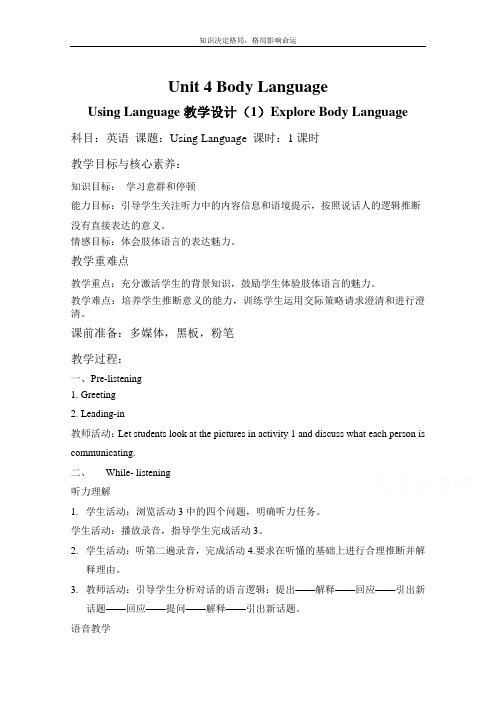
Unit 4 Body LanguageUsing Language教学设计(1)Explore Body Language科目:英语课题:Using Language 课时:1课时教学目标与核心素养:知识目标:学习意群和停顿能力目标:引导学生关注听力中的内容信息和语境提示,按照说话人的逻辑推断没有直接表达的意义。
情感目标:体会肢体语言的表达魅力。
教学重难点教学重点:充分激活学生的背景知识,鼓励学生体验肢体语言的魅力。
教学难点:培养学生推断意义的能力,训练学生运用交际策略请求澄清和进行澄清。
课前准备:多媒体,黑板,粉笔教学过程:一、Pre-listening1. Greeting2. Leading-in教师活动:Let students look at the pictures in activity 1 and discuss what each person iscommunicating.二、While- listening听力理解1.学生活动:浏览活动3中的四个问题,明确听力任务。
学生活动:播放录音,指导学生完成活动3。
2.学生活动:听第二遍录音,完成活动4.要求在听懂的基础上进行合理推断并解释理由。
3.教师活动:引导学生分析对话的语言逻辑:提出——解释——回应——引出新话题——回应——提问——解释——引出新话题。
语音教学(1)教师播放活动1的录音,让学生边听边关注每个句子中意群的划分和停顿。
(2)教师用幻灯片呈现没有划分意群的活动1中的长句,组织学生两人一组开展活动:小组中一人自己朗读没有划分意群的长句,另一个人认真记录同伴的停顿;然后两人交换角色。
接着,教师播放录音,全班跟读。
最后,以小组为单位讨论自己读的和录音的区别,并说一说划分意群的作用和规则。
(3)教师引导学生模仿活动1对活动2的文本划分意群。
教师解释划分意群的基本规则:A sentence can be divided into several sense groups according to the meaning, grammatical structures, and punctuation。
新教材高二英语人教版必修第一册教案:Unit 4 Section B 含答案
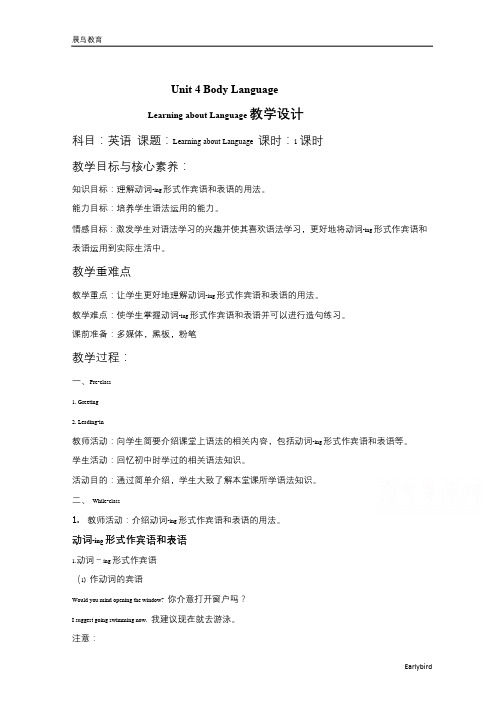
Unit 4 Body LanguageLearning about Language 教学设计科目:英语课题:Learning about Language 课时:1 课时教学目标与核心素养:知识目标:理解动词-ing 形式作宾语和表语的用法。
能力目标:培养学生语法运用的能力。
情感目标:激发学生对语法学习的兴趣并使其喜欢语法学习,更好地将动词-ing 形式作宾语和表语运用到实际生活中。
教学重难点教学重点:让学生更好地理解动词-ing 形式作宾语和表语的用法。
教学难点:使学生掌握动词-ing 形式作宾语和表语并可以进行造句练习。
课前准备:多媒体,黑板,粉笔教学过程:一、Pre-class1. Greeting2. Leading-in教师活动:向学生简要介绍课堂上语法的相关内容,包括动词-ing 形式作宾语和表语等。
学生活动:回忆初中时学过的相关语法知识。
活动目的:通过简单介绍,学生大致了解本堂课所学语法知识。
二、While-class1. 教师活动:介绍动词-ing 形式作宾语和表语的用法。
动词-ing 形式作宾语和表语1.动词-ing 形式作宾语(1) 作动词的宾语Would you mind opening the window? 你介意打开窗户吗?I suggest going swimming now. 我建议现在就去游泳。
注意:常接动词-ing 形式作宾语的动词可用下面的口诀帮助记忆:避免错过少延期(avoid, miss, postpone)建议完成多练习(advise, finish, practise)喜欢想象禁不住(enjoy, imagine, can't help)承认否定与嫉妒(admit, deny, envy)逃避冒险莫原谅(escape, risk, excuse)忍受保持不介意(stand, keep, mind)(2) 作介词的宾语在下面的短语中,常用动词-ing 形式作介词的宾语:insist on, object to, be good at, be fond of,lead to, put off, give up, look forward to, feel like, devote to, get used to, pay attention to 等。
- 1、下载文档前请自行甄别文档内容的完整性,平台不提供额外的编辑、内容补充、找答案等附加服务。
- 2、"仅部分预览"的文档,不可在线预览部分如存在完整性等问题,可反馈申请退款(可完整预览的文档不适用该条件!)。
- 3、如文档侵犯您的权益,请联系客服反馈,我们会尽快为您处理(人工客服工作时间:9:00-18:30)。
Period 4 Listening and speaking
Teaching goals
Train their listening and speaking abilities.
Teaching important and difficult points
Help the students to talk about position, space and direction and illustrate ways that listeners indicate that they are listening to the speaker.
Teaching methods
Pair work and group work, discussion and cooperation
Teaching aids
A recorder, a computer, and a blackboard
Teaching procedures
Step1 Listening
1.The first time the students listen to the tape they are expected to listen for the gist only. Read
Ex1 on page 6 with students so that they know what to listen for and play the recording right through without stopping.
4 Geographic areas of California
2 Where George’s tour started
3 California not as George expected
1 Where George is now
5 Californian people
2.Read the postcard on page 6 with students and ask them to recall the missing information.
Then play the tape right through while students listen for the missing details. Play it twice if necessary and then check answers by playing the tape again and stopping when the missing details are given.
Dear Sam,
I’m here in Joshua Tree National Park, in the___southeastern_
part of California. Have been traveling around the state of
__california___ for three weeks now. Very different from what
I have seen in ___American movies____ . Not everyone is ___rich__
and not everyone lives near the __beach_____. First traveled
southeast through rich farmland then to the central part.
They grow everything here including __cotton, nuts, vegetables_____
and fruit. Cattle too. Then traveled further ____southeast______ into
mountains and ____desert_____.Californians are very friendly,
and they are from many different ___races_____ and cultures.
Every culture has its own ____music__, ___festivals_____, food and art.
Most interesting. Wish you were here. Give my love to Paula.
George
3.Tell the students that when they listen to this time they are to focus on what Christie, who is
mainly listening, says. Play the tape and stop after each thing that Christie says so that
Step 2 Speaking
With a partner hold a telephone conversation about a place you have visited recently.
1.Sit back to back with your partner so you can’t see each other.
2.Partner A: Talk about where the place is , what the climate is like, what you thought about
the people, and any other interesting things you saw or did.
Partner B: Encourage your partner to talk by asking questions and making comments.
3. Swap roles. Partner B tells Partner A about his\her visit.
Step 3 Homework
Write a short passage about the place they have visited recently.。
